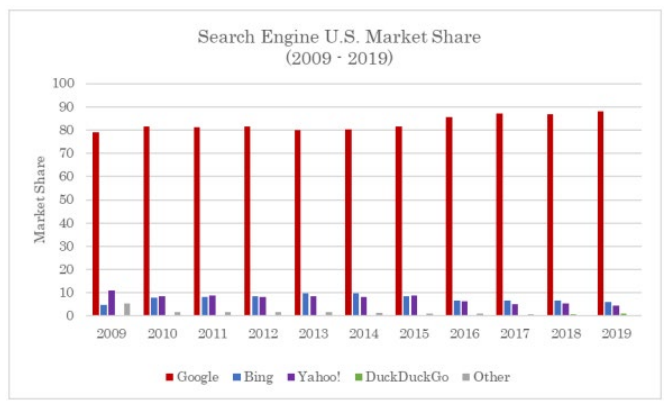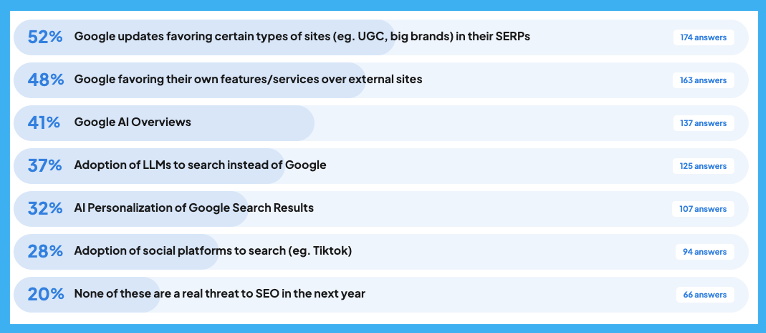Yelp v. Google, SEO Challenges, Section 230's New Crack

It's On: Yelp v. Google
Yelp has arguably been Google's chief antagonist over the years. For example, it was Yelp's behind-the-scenes lobbying of European regulators that basically killed the early "rival links" antitrust settlement. And CEO Jeremy Stoppleman's 2018 60 Minutes interview was instrumental in popularizing the narrative that Google was a monopoly abusing its power. Now, Yelp has sued Google for violations of federal antitrust and California unfair competition law, based on Google's "self-preferencing and gatekeeping." The complaint argues Google has engaged in numerous anti-competitive practices, including stealing information from Yelp’s website and passing it off as Google’s own; preferencing Google’s own local search results over Yelp’s; implementing a 'OneBox' feature to prioritize Google’s own inferior local search services at the top of the search results page; and even going so far as to tweak its algorithm and steer customers away from Yelp." The timing of this suit is significant, on the heels of the DC Circuit federal court finding that Google had illegally exercised monopoly power. Yelp is seeking both money damages and an injunction to stop Google's alleged self-preferencing. The antagonism between the companies goes back to Google's failed attempt in 2009 to buy Yelp.

Our take:
- Yelp's complaint goes to Google's control over its SERP, found years ago to be editorially sacrosanct ("free speech") – but no longer.
- The recent DC case (and liability finding) directly paves the way for Yelp, but so do the numerous past regulatory actions against Google.
- Earlier this case would have been dismissed (literally and figuratively) as competitive sour grapes. Today, Yelp has a real shot at winning.
- In Europe, Google is trying to keep local out of the discussion of DMA compliance, arguing that it's part of Google's core search experience.
SEO Is Getting Harder
SEO is one of the most widely offered and in-demand marketing services. In a 2022 Near Media agency survey (unpublished), we found that it was the highest retention and most profitable service. It was also the second most common offering after website development. However, a new SEOFOMO survey of "337 SEO specialists" shows it's getting harder to sell and fulfill SEO services. The survey respondents' locations and firm sizes weren't specified but the survey appears to reflect the experiences of smaller firms and independent consultants. The largest group of respondents (43%) said it was now harder to sell SEO services than a couple of years ago. Roughly 70% said they were able to achieve desired results between 70% and more than 90% of the time. (This self-assessed success probably needs to be taken with a grain of salt.) The rest fell short to varying degrees. Despite the success claims, 58% said achieving SEOs success was more difficult than two years ago. Respondents identified several factors that were seen as "a threat to their SEO consulting." The top three were Google UGC and brand site favoritism, self-preferencing and AIO overviews.

Our take:
- The Near Media survey found that SEO also had the fastest churn, in addition to the best retention, and that SEO was easier for smaller agencies to implement than large ones.
- Collectively the biggest complaint, in the SEOFOMO survey, appears to be Google's SERP changes that reduce the visibility of websites.
- SEOs have had a tumultuous couple of years, as CTR revelations, ranking volatility and AI have created new concerns and uncertainty.
Crack in the Section 230 Immunity Wall
The question of how much platforms must moderate their content and what should happen if they don't continues to be a hot issue. This week, for example, Pavel Durov, CEO of messaging app Telegram, was arrested in France. Authorities alleged that Telegram enabled organized crime, money laundering and other types of illegal activity by failing to sufficiently moderate conversations on its platform. This event, which has shocked some in the tech industry, again raises the question of the accountability of technology executives for misconduct, disinformation and illegal activity on their platforms. In Europe there is no Section 230 to protect tech companies from liability. And the Digital Services Act explicitly mandates content moderation. In the US, of course, there is Section 230 which has immunized platforms from any liability for bad conduct or illegal behavior on their platforms. But now the 3rd Circuit Court of Appeals reinstated a civil suit against TikTok, saying that Section 230 did not immunize algorithms (vs. just "content"), which ultimately caused harm. This is a major decision but appears to directly "fly in the face" of the ruling in a recent SCOTUS decision in Gonzalez v. Google, which said that algorithms did not "materially contribute" to the alleged illegality.

Our take:
- There are many "ifs," but if the lower court finds TikTok liability (and it holds) this opens the door to more lawsuits against "big tech."
- It's unclear what will happen if this TikTok case makes it to SCOTUS. For now, this is a MAJOR crack in the 230 immunity shield.
- People have been looking for ways to "hold platforms accountable" for lax content moderation. If this 230 exception ruling survives, this is it.
Recent Analysis
- Near Memo episode 171: GBP phone hacking problems persist, new FTC fake reviews rules, SearchGPT & the future of search.
- ICYMI: Is Google’s engagement-hacking masking stalled growth?, by David Mihm.
Short Takes
- Why you should seek reviews for local sites beyond Google.
- Google making Maps more ad-friendly?
- Case study: adding address of SAB to website boosted local ranking.
- Booking for LSAs and GBPs are merging.
- Optimizing for Google's "From Sources Across the Web" SERP feature.
- Google says link numbers and word counts don't matter.
- AIOs starting to appear above ads in mobile search results.
- Some marketers have more faith in TikTok than Google ads.
- Major problems with judge for Google in new adtech antitrust trail.
- Major publishers opting out of Apple AI scraping.
- Baidu blocking Google and Bing from conducting AI-related scraping.
- Controversial CA AI bill moves closer to passage.
Listen to our latest podcast.

How can we make this better? Email us with suggestions and recommendations.


